译林版(2019) 选择性必修第一册 Unit 1 Food Matters Integrated skills 课件-(27张PPT)
文档属性
| 名称 | 译林版(2019) 选择性必修第一册 Unit 1 Food Matters Integrated skills 课件-(27张PPT) |
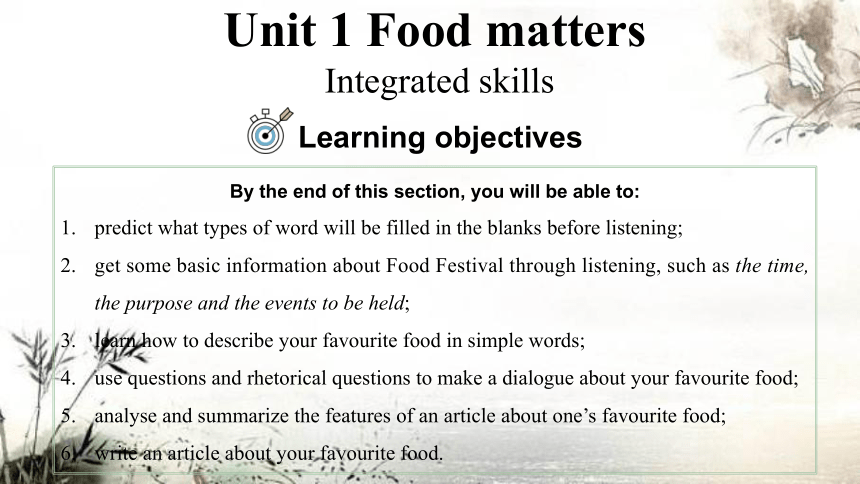
|
|
| 格式 | pptx | ||
| 文件大小 | 11.1MB | ||
| 资源类型 | 教案 | ||
| 版本资源 | 牛津译林版(2019) | ||
| 科目 | 英语 | ||
| 更新时间 | 2022-10-07 00:00:00 | ||
图片预览

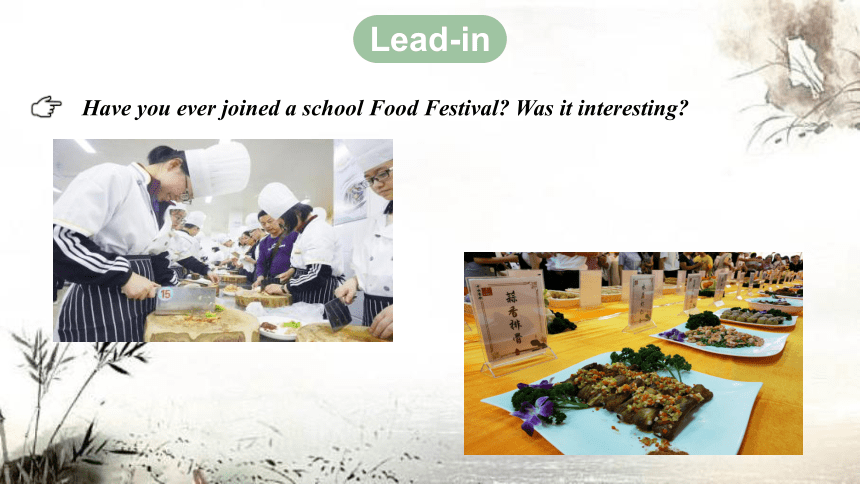
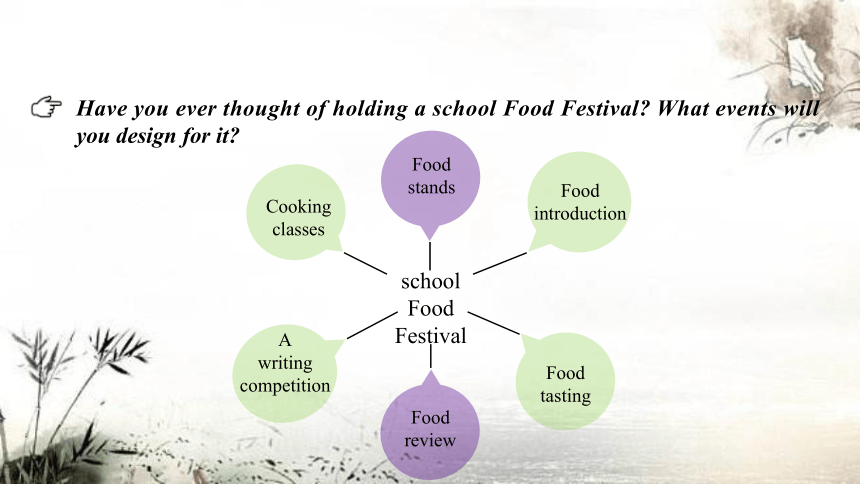
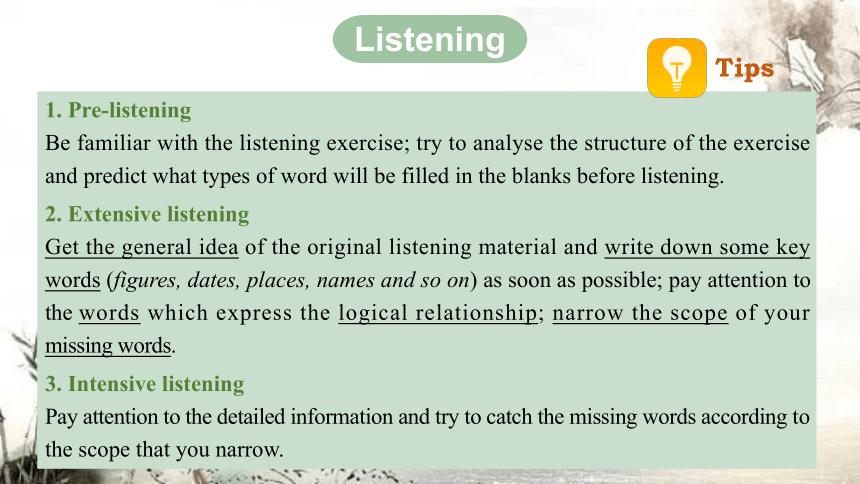
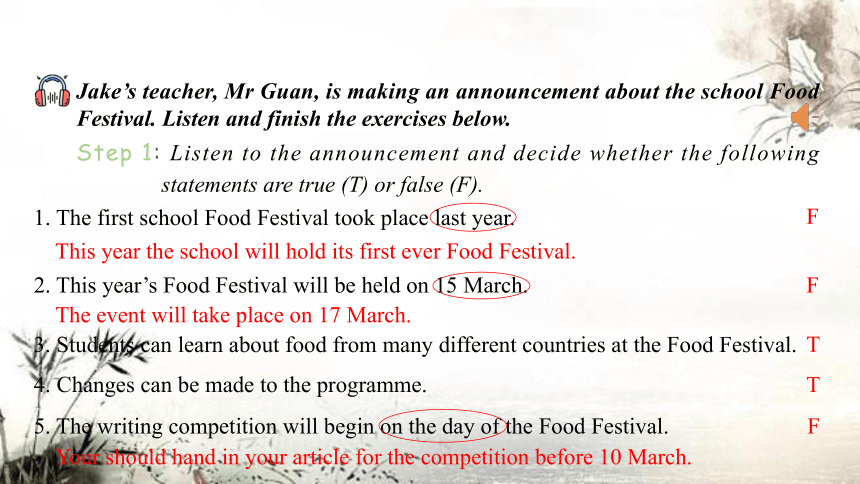
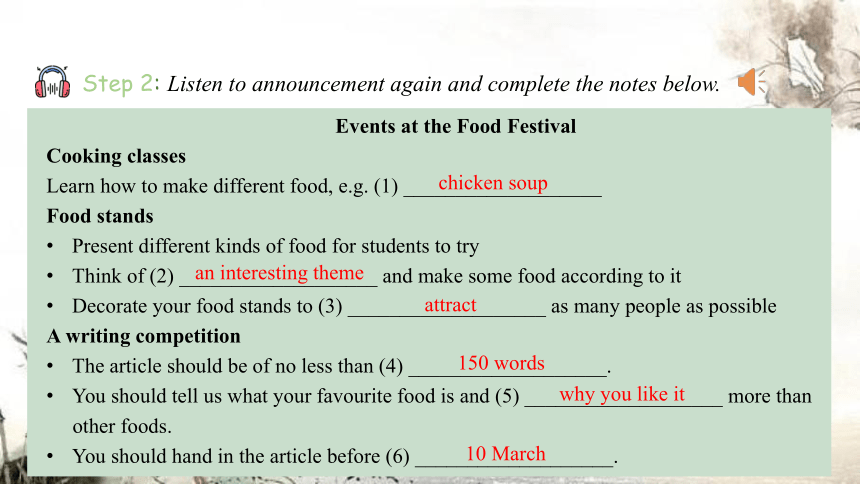
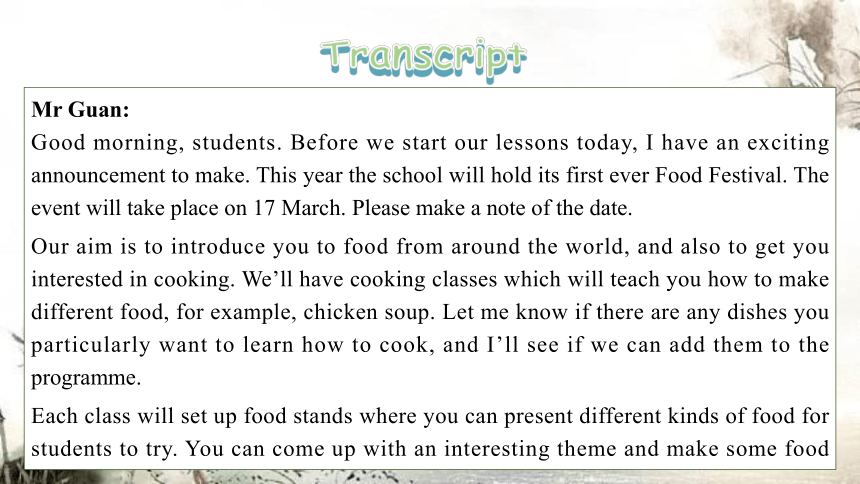
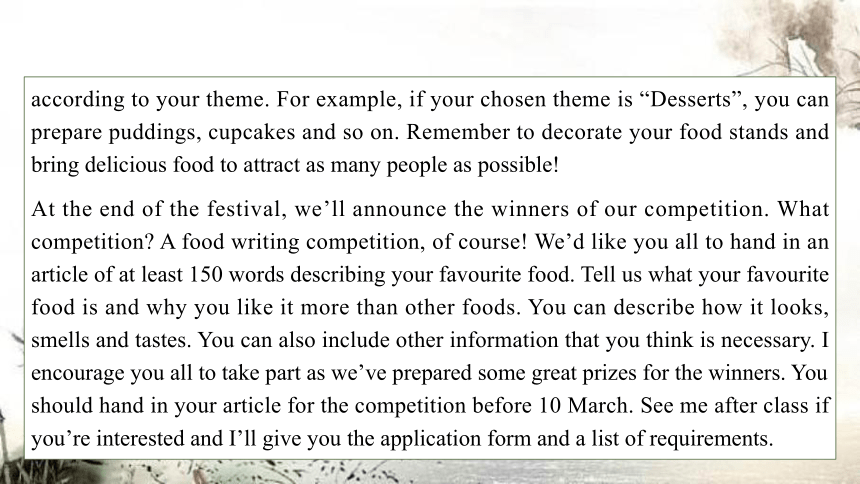
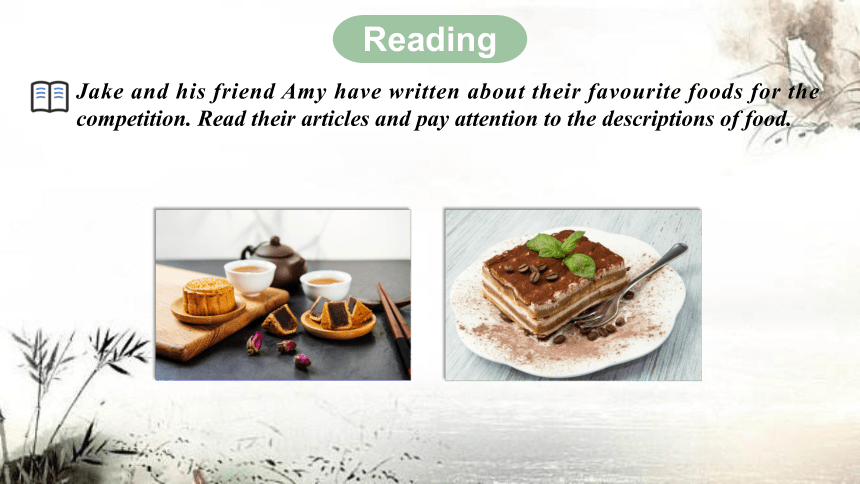
文档简介
(共27张PPT)
By the end of this section, you will be able to:
predict what types of word will be filled in the blanks before listening;
get some basic information about Food Festival through listening, such as the time, the purpose and the events to be held;
learn how to describe your favourite food in simple words;
use questions and rhetorical questions to make a dialogue about your favourite food;
analyse and summarize the features of an article about one’s favourite food;
write an article about your favourite food.
Learning objectives
Unit 1 Food matters
Integrated skills
Have you ever joined a school Food Festival Was it interesting
Lead-in
school
Food
Festival
Food
stands
Food
introduction
Food
tasting
Food
review
A
writing
competition
Cooking
classes
Have you ever thought of holding a school Food Festival What events will you design for it
1. Pre-listening
Be familiar with the listening exercise; try to analyse the structure of the exercise and predict what types of word will be filled in the blanks before listening.
2. Extensive listening
Get the general idea of the original listening material and write down some key
words (figures, dates, places, names and so on) as soon as possible; pay attention to
the words which express the logical relationship; narrow the scope of your
missing words.
3. Intensive listening
Pay attention to the detailed information and try to catch the missing words according to the scope that you narrow.
Listening
Tips
Listening
3. Students can learn about food from many different countries at the Food Festival.
Jake’s teacher, Mr Guan, is making an announcement about the school Food Festival. Listen and finish the exercises below.
Step 1: Listen to the announcement and decide whether the following
statements are true (T) or false (F).
This year the school will hold its first ever Food Festival.
F
The event will take place on 17 March.
F
T
T
F
1. The first school Food Festival took place last year.
2. This year’s Food Festival will be held on 15 March.
4. Changes can be made to the programme.
5. The writing competition will begin on the day of the Food Festival.
Your should hand in your article for the competition before 10 March.
Step 2: Listen to announcement again and complete the notes below.
Events at the Food Festival
Cooking classes
Learn how to make different food, e.g. (1) ___________________
Food stands
Present different kinds of food for students to try
Think of (2) ___________________ and make some food according to it
Decorate your food stands to (3) ___________________ as many people as possible
A writing competition
The article should be of no less than (4) ___________________.
You should tell us what your favourite food is and (5) ___________________ more than
other foods.
You should hand in the article before (6) ___________________.
chicken soup
an interesting theme
attract
150 words
why you like it
10 March
Transcript
Mr Guan:
Good morning, students. Before we start our lessons today, I have an exciting announcement to make. This year the school will hold its first ever Food Festival. The event will take place on 17 March. Please make a note of the date.
Our aim is to introduce you to food from around the world, and also to get you interested in cooking. We’ll have cooking classes which will teach you how to make different food, for example, chicken soup. Let me know if there are any dishes you particularly want to learn how to cook, and I’ll see if we can add them to the programme.
Each class will set up food stands where you can present different kinds of food for students to try. You can come up with an interesting theme and make some food
according to your theme. For example, if your chosen theme is “Desserts”, you can prepare puddings, cupcakes and so on. Remember to decorate your food stands and
bring delicious food to attract as many people as possible!
At the end of the festival, we’ll announce the winners of our competition. What competition A food writing competition, of course! We’d like you all to hand in an article of at least 150 words describing your favourite food. Tell us what your favourite food is and why you like it more than other foods. You can describe how it looks, smells and tastes. You can also include other information that you think is necessary. I encourage you all to take part as we’ve prepared some great prizes for the winners. You should hand in your article for the competition before 10 March. See me after class if you’re interested and I’ll give you the application form and a list of requirements.
Reading
Jake and his friend Amy have written about their favourite foods for the competition. Read their articles and pay attention to the descriptions of food.
Introduction
Experience
Characteristics
Step 1: Read the articles and analyze the structure of them.
Conclusion
Introduction
Experiences
Characteristics
Conclusion/association
Reading
Step 2: Read the articles again and fill in the following table.
Items Mooncakes Tiramisu
First try He tried his first mooncake with his family when he was very little in his grandparents’ yard.
Its appearance
Its smell Not mentioned.
Its taste
Reasons for loving it Whenever she feels unhappy, she eats this dessert and it makes her feel better.
Other information Materials: The feeling in hand: The name tiramisu means “cheer me up” in Italian.
She first tried it about two years ago when she visited a bakery with her parents.
Mooncakes look adorable — small, round and shiny golden-brown.
There are three layers of the cake and the cheese is between the layers.
Tiramisu does not look very active — it
is brown and white.
Delicious.
Mooncakes have a sweet and mild taste of the red bean.
It is light, creamy, soft, smooth, with a bitter taste of coffee but not strong.
The satisfying taste is out of this world and brings happy memories to mind.
flour and red beans.
warm and heavy
Speaking
In pairs, talk about your favourite food. Use the following questions to help you.
What is your favourite food
Why do you like it (How it looks, smells, tastes and feels in your mouth,
how you associate it with a particular experience, etc.)
Rhetorical questions:
Do you know what you are missing
How can I ever forget the first bite
How can I refuse it when faced with such a satisfying taste
Using rhetorical questions in conversation
A rhetorical question is a figure of speech in the form of a question that is asked to emphasize a point or to express feelings and attitudes. For example, when you ask “How can I forget such a tasty dish ”, you are actually emphasizing that you always remember the dish.
Tips
A: What is your favourite food
B: Tofu! My favourite style is golden fried stinky tofu.
A: Fried food always hits the spot. But stinky tofu I’ve never tried it.
B: Really As the name suggests, the smell is terrible but the taste is actually quite
mild — it tastes like fried tofu with less of the bean flavour and more of a slight
sweetness. The sauce makes it taste even more delicious.
A: I’m still not sure if I could stand the smell.
B: Do you know what you are missing Well, if you ever decide to try it, I recommend
recommend the Nanjing style or Changsha style. They are the most famous.
Sample Answer
A: I’ll remember that. When did you first try it
B: When I was little, my grandad took me to a street market. I especially remember the
smell because it stood out. I thought it was dead fish or bad eggs.
A: What did you think when you took your first bite
B: How can I ever forget the first bite The deep-fried stinky tofu is firm on the
outside but soft and juicy on the inside. As I chewed the tofu, its complex flavour
mixed with the sauce flavour burst out inside my mouth.
A: It doesn’t sound too bad. I might give it a try.
B: You bet! After trying more, I can tell the differences between various versions of
stinky tofu. Their unique flavours and smells really excite my taste buds. It has
awakened my interest in tasting foods I’m not familiar with.
Sample Answer
Writing
Write an article about your favourite food. Use your ideas from Part C and the information in parts A and B to help you.
Planning your writing
Learning about the text type
An article about your favourite food is a piece of descriptive writing which can create a vivid picture in
readers’ minds through plenty of sensory details.
Learning about the structure
When writing an article about your favourite food, you can follow the structure below:
★ State clearly what your favourite food is.
★ Mention your experiences of tasting it, especially for the first time.
★ Describe the characteristics of the food, such as its appearance, smell, taste and way of cooking.
Learning about the language
When you describe food, you can use adjectives to create an image of the food in the mind of the reader.
Adjectives commonly used to describe food include smelly, bitter, sweet, salty, juicy, creamy, silky, smooth,
soft, crisp, etc.
Stinky tofu: once you start, you’ll never stop!
Of all the different ways of cooking tofu (also known as bean curd), my favourite is stinky tofu. Throughout China there are a number of different versions of stinky tofu: some are fried golden brown while others are blackish blue. Of all versions of stinky tofu, the Nanjing style and Changsha style are the most famous. I first tried stinky tofu at a street market with my grandad when I was very little. As the name suggests, the smell is terrible but surprisingly, the taste is actually quite mild — it tastes like fried tofu with less of the bean flavour and more of a slight sweetness. The sauce makes it taste even more delicious. A big part of the experience is how it feels in your mouth: deep-fried stinky tofu is firm on the outside but soft and juicy on the inside. Ever since my first taste of stinky tofu, I have always wanted to try more. Now I can tell the differences between various versions of stinky tofu and I like all of them because of their unique flavours as well as their unique smells!
Sample Answer
Remember to check your writing after you finish and exchange drafts between you and your partner. Pay attention to the following aspects:
□ Punctuation □ Spelling □ Grammar
□ Choice of words □ Style (formal/informal) □ Structure
Self-review
Do you use adjectives to describe the food Is your description vivid enough
What changes can you make to improve your writing
Checking your writing
Peer review
Does your partner think there are enough sensory details in your writing
Which part does your partner find most interesting
Words and Expressions
1. Mooncakes: a taste that is out of this world. (P9)
月饼:味道好极了!
out of this world 好(或美等)得不得了,非凡,呱呱叫
★ 通常作表语
例句
The music in the show was fantastic and the costumes were out of this world.
这个节目的音乐太棒了,服装也很好。
拓展 out of breath 气喘吁吁,喘不过来气 out of condition 身体不好,情况欠佳
out of control 失去控制 out of order 有毛病,安排不当
out of place 在不适当的位置;不适宜 out of reach 够不着
例句
· She felt out of place in their company.
跟他们在一起,她感觉不自在。
2. There are many versions of mooncakes from different places around China. (P9)
中国各地有许多不同品种的月饼。
version n. 变体,变种;说法;版本
搭配 a new/different version 新版本/不同版本
an earlier/a previous version 更早的/之前的版本
an updated version of the app 更新过的应用程序版本
the original version of the movie 这部电影最初的版本
例句
If you want to play the video, you have to download the latest version of the software.
如果你想播放这段视频,你得下载这个软件的最新版本。
拓展 version n. 说法;版本
the radio version of Pride and Prejudice 根据《傲慢与偏见》改编的广播版本
3. My elderly grandmother still bakes mooncakes for the whole family every year. (P9)
年迈的祖母仍然每年为全家人烘焙月饼。
bake vt. & vi. 烘烤;烤硬
搭配
bake sth for sb = bake sb sth 为某人烤……
例句
Don’t forget to bake a cake as tomorrow is his birthday.
明天是他的生日,别忘了烘焙蛋糕。
拓展
bake v. 烤硬;炎热,灼热
例句
· The burning sun baked the ground hard. 炙热的太阳把地面晒硬了。
· It is baking in Nanjing in summer. 夏天南京非常热。
4. When she places them on the table, they look adorable — small, round and shiny golden-brown.
(P9)
她把月饼放在桌上时,它们看起来很可爱——小小的,圆圆的,闪闪的金棕色。
adorable adj. 可爱的,讨人喜爱的
例句
She always thinks the panda is one of the most adorable animals.
她总认为熊猫是最招人喜爱的动物之一。
拓展
adore vt. 热爱,爱慕;喜爱 adore (doing) sth 喜欢(做)某事
adoration n. 崇拜,爱慕
例句
· It is obvious that he adores going to the cinema.
显然,他喜欢去看电影。
5. As I take each bite, the sweet and mild flavour of the red bean filling slowly fills my mouth. (P9)
我每咬一口,唇齿间渐渐充满红豆沙馅料的味道,甜而不腻。
mild adj. 不浓的,淡味的;暖和的;温和的;不严重的
例句
I prefer bread with mild cheese. 我喜欢面包搭配淡奶酪。
The coffee has a soft, mild flavour. 这款咖啡的味道柔和清香。
Autumn is the best season to travel in Beijing for its mild weather.
秋季是去北京旅游的最佳季节,那个时候天气暖和。
拓展
mildly adv. 温和地,温柔地;轻微地
mildness n. 温和;暖和
例句
The old woman spoke to us mildly. 老妇人温和地和我们说话。
6. There is also a bitter taste of coffee but this flavour is not very strong. (P9)
它还有一点咖啡的苦味,但味道不是很浓。
bitter adj. 味苦的;激烈的;令人难过的;严寒的
搭配
a bitter battle/struggle 激烈的争斗
a bitter disappointment 伤心失望的事
例句
I don’t like black coffee because it leaves a bitter taste in the mouth.
我不喜欢黑咖啡,因为它会在嘴里留下苦味。
· The two groups had some bitter exchanges.
两个团队之间发生过一些激烈的争吵。
Homework
Read more articles of your classmates and polish up your writing.
By the end of this section, you will be able to:
predict what types of word will be filled in the blanks before listening;
get some basic information about Food Festival through listening, such as the time, the purpose and the events to be held;
learn how to describe your favourite food in simple words;
use questions and rhetorical questions to make a dialogue about your favourite food;
analyse and summarize the features of an article about one’s favourite food;
write an article about your favourite food.
Learning objectives
Unit 1 Food matters
Integrated skills
Have you ever joined a school Food Festival Was it interesting
Lead-in
school
Food
Festival
Food
stands
Food
introduction
Food
tasting
Food
review
A
writing
competition
Cooking
classes
Have you ever thought of holding a school Food Festival What events will you design for it
1. Pre-listening
Be familiar with the listening exercise; try to analyse the structure of the exercise and predict what types of word will be filled in the blanks before listening.
2. Extensive listening
Get the general idea of the original listening material and write down some key
words (figures, dates, places, names and so on) as soon as possible; pay attention to
the words which express the logical relationship; narrow the scope of your
missing words.
3. Intensive listening
Pay attention to the detailed information and try to catch the missing words according to the scope that you narrow.
Listening
Tips
Listening
3. Students can learn about food from many different countries at the Food Festival.
Jake’s teacher, Mr Guan, is making an announcement about the school Food Festival. Listen and finish the exercises below.
Step 1: Listen to the announcement and decide whether the following
statements are true (T) or false (F).
This year the school will hold its first ever Food Festival.
F
The event will take place on 17 March.
F
T
T
F
1. The first school Food Festival took place last year.
2. This year’s Food Festival will be held on 15 March.
4. Changes can be made to the programme.
5. The writing competition will begin on the day of the Food Festival.
Your should hand in your article for the competition before 10 March.
Step 2: Listen to announcement again and complete the notes below.
Events at the Food Festival
Cooking classes
Learn how to make different food, e.g. (1) ___________________
Food stands
Present different kinds of food for students to try
Think of (2) ___________________ and make some food according to it
Decorate your food stands to (3) ___________________ as many people as possible
A writing competition
The article should be of no less than (4) ___________________.
You should tell us what your favourite food is and (5) ___________________ more than
other foods.
You should hand in the article before (6) ___________________.
chicken soup
an interesting theme
attract
150 words
why you like it
10 March
Transcript
Mr Guan:
Good morning, students. Before we start our lessons today, I have an exciting announcement to make. This year the school will hold its first ever Food Festival. The event will take place on 17 March. Please make a note of the date.
Our aim is to introduce you to food from around the world, and also to get you interested in cooking. We’ll have cooking classes which will teach you how to make different food, for example, chicken soup. Let me know if there are any dishes you particularly want to learn how to cook, and I’ll see if we can add them to the programme.
Each class will set up food stands where you can present different kinds of food for students to try. You can come up with an interesting theme and make some food
according to your theme. For example, if your chosen theme is “Desserts”, you can prepare puddings, cupcakes and so on. Remember to decorate your food stands and
bring delicious food to attract as many people as possible!
At the end of the festival, we’ll announce the winners of our competition. What competition A food writing competition, of course! We’d like you all to hand in an article of at least 150 words describing your favourite food. Tell us what your favourite food is and why you like it more than other foods. You can describe how it looks, smells and tastes. You can also include other information that you think is necessary. I encourage you all to take part as we’ve prepared some great prizes for the winners. You should hand in your article for the competition before 10 March. See me after class if you’re interested and I’ll give you the application form and a list of requirements.
Reading
Jake and his friend Amy have written about their favourite foods for the competition. Read their articles and pay attention to the descriptions of food.
Introduction
Experience
Characteristics
Step 1: Read the articles and analyze the structure of them.
Conclusion
Introduction
Experiences
Characteristics
Conclusion/association
Reading
Step 2: Read the articles again and fill in the following table.
Items Mooncakes Tiramisu
First try He tried his first mooncake with his family when he was very little in his grandparents’ yard.
Its appearance
Its smell Not mentioned.
Its taste
Reasons for loving it Whenever she feels unhappy, she eats this dessert and it makes her feel better.
Other information Materials: The feeling in hand: The name tiramisu means “cheer me up” in Italian.
She first tried it about two years ago when she visited a bakery with her parents.
Mooncakes look adorable — small, round and shiny golden-brown.
There are three layers of the cake and the cheese is between the layers.
Tiramisu does not look very active — it
is brown and white.
Delicious.
Mooncakes have a sweet and mild taste of the red bean.
It is light, creamy, soft, smooth, with a bitter taste of coffee but not strong.
The satisfying taste is out of this world and brings happy memories to mind.
flour and red beans.
warm and heavy
Speaking
In pairs, talk about your favourite food. Use the following questions to help you.
What is your favourite food
Why do you like it (How it looks, smells, tastes and feels in your mouth,
how you associate it with a particular experience, etc.)
Rhetorical questions:
Do you know what you are missing
How can I ever forget the first bite
How can I refuse it when faced with such a satisfying taste
Using rhetorical questions in conversation
A rhetorical question is a figure of speech in the form of a question that is asked to emphasize a point or to express feelings and attitudes. For example, when you ask “How can I forget such a tasty dish ”, you are actually emphasizing that you always remember the dish.
Tips
A: What is your favourite food
B: Tofu! My favourite style is golden fried stinky tofu.
A: Fried food always hits the spot. But stinky tofu I’ve never tried it.
B: Really As the name suggests, the smell is terrible but the taste is actually quite
mild — it tastes like fried tofu with less of the bean flavour and more of a slight
sweetness. The sauce makes it taste even more delicious.
A: I’m still not sure if I could stand the smell.
B: Do you know what you are missing Well, if you ever decide to try it, I recommend
recommend the Nanjing style or Changsha style. They are the most famous.
Sample Answer
A: I’ll remember that. When did you first try it
B: When I was little, my grandad took me to a street market. I especially remember the
smell because it stood out. I thought it was dead fish or bad eggs.
A: What did you think when you took your first bite
B: How can I ever forget the first bite The deep-fried stinky tofu is firm on the
outside but soft and juicy on the inside. As I chewed the tofu, its complex flavour
mixed with the sauce flavour burst out inside my mouth.
A: It doesn’t sound too bad. I might give it a try.
B: You bet! After trying more, I can tell the differences between various versions of
stinky tofu. Their unique flavours and smells really excite my taste buds. It has
awakened my interest in tasting foods I’m not familiar with.
Sample Answer
Writing
Write an article about your favourite food. Use your ideas from Part C and the information in parts A and B to help you.
Planning your writing
Learning about the text type
An article about your favourite food is a piece of descriptive writing which can create a vivid picture in
readers’ minds through plenty of sensory details.
Learning about the structure
When writing an article about your favourite food, you can follow the structure below:
★ State clearly what your favourite food is.
★ Mention your experiences of tasting it, especially for the first time.
★ Describe the characteristics of the food, such as its appearance, smell, taste and way of cooking.
Learning about the language
When you describe food, you can use adjectives to create an image of the food in the mind of the reader.
Adjectives commonly used to describe food include smelly, bitter, sweet, salty, juicy, creamy, silky, smooth,
soft, crisp, etc.
Stinky tofu: once you start, you’ll never stop!
Of all the different ways of cooking tofu (also known as bean curd), my favourite is stinky tofu. Throughout China there are a number of different versions of stinky tofu: some are fried golden brown while others are blackish blue. Of all versions of stinky tofu, the Nanjing style and Changsha style are the most famous. I first tried stinky tofu at a street market with my grandad when I was very little. As the name suggests, the smell is terrible but surprisingly, the taste is actually quite mild — it tastes like fried tofu with less of the bean flavour and more of a slight sweetness. The sauce makes it taste even more delicious. A big part of the experience is how it feels in your mouth: deep-fried stinky tofu is firm on the outside but soft and juicy on the inside. Ever since my first taste of stinky tofu, I have always wanted to try more. Now I can tell the differences between various versions of stinky tofu and I like all of them because of their unique flavours as well as their unique smells!
Sample Answer
Remember to check your writing after you finish and exchange drafts between you and your partner. Pay attention to the following aspects:
□ Punctuation □ Spelling □ Grammar
□ Choice of words □ Style (formal/informal) □ Structure
Self-review
Do you use adjectives to describe the food Is your description vivid enough
What changes can you make to improve your writing
Checking your writing
Peer review
Does your partner think there are enough sensory details in your writing
Which part does your partner find most interesting
Words and Expressions
1. Mooncakes: a taste that is out of this world. (P9)
月饼:味道好极了!
out of this world 好(或美等)得不得了,非凡,呱呱叫
★ 通常作表语
例句
The music in the show was fantastic and the costumes were out of this world.
这个节目的音乐太棒了,服装也很好。
拓展 out of breath 气喘吁吁,喘不过来气 out of condition 身体不好,情况欠佳
out of control 失去控制 out of order 有毛病,安排不当
out of place 在不适当的位置;不适宜 out of reach 够不着
例句
· She felt out of place in their company.
跟他们在一起,她感觉不自在。
2. There are many versions of mooncakes from different places around China. (P9)
中国各地有许多不同品种的月饼。
version n. 变体,变种;说法;版本
搭配 a new/different version 新版本/不同版本
an earlier/a previous version 更早的/之前的版本
an updated version of the app 更新过的应用程序版本
the original version of the movie 这部电影最初的版本
例句
If you want to play the video, you have to download the latest version of the software.
如果你想播放这段视频,你得下载这个软件的最新版本。
拓展 version n. 说法;版本
the radio version of Pride and Prejudice 根据《傲慢与偏见》改编的广播版本
3. My elderly grandmother still bakes mooncakes for the whole family every year. (P9)
年迈的祖母仍然每年为全家人烘焙月饼。
bake vt. & vi. 烘烤;烤硬
搭配
bake sth for sb = bake sb sth 为某人烤……
例句
Don’t forget to bake a cake as tomorrow is his birthday.
明天是他的生日,别忘了烘焙蛋糕。
拓展
bake v. 烤硬;炎热,灼热
例句
· The burning sun baked the ground hard. 炙热的太阳把地面晒硬了。
· It is baking in Nanjing in summer. 夏天南京非常热。
4. When she places them on the table, they look adorable — small, round and shiny golden-brown.
(P9)
她把月饼放在桌上时,它们看起来很可爱——小小的,圆圆的,闪闪的金棕色。
adorable adj. 可爱的,讨人喜爱的
例句
She always thinks the panda is one of the most adorable animals.
她总认为熊猫是最招人喜爱的动物之一。
拓展
adore vt. 热爱,爱慕;喜爱 adore (doing) sth 喜欢(做)某事
adoration n. 崇拜,爱慕
例句
· It is obvious that he adores going to the cinema.
显然,他喜欢去看电影。
5. As I take each bite, the sweet and mild flavour of the red bean filling slowly fills my mouth. (P9)
我每咬一口,唇齿间渐渐充满红豆沙馅料的味道,甜而不腻。
mild adj. 不浓的,淡味的;暖和的;温和的;不严重的
例句
I prefer bread with mild cheese. 我喜欢面包搭配淡奶酪。
The coffee has a soft, mild flavour. 这款咖啡的味道柔和清香。
Autumn is the best season to travel in Beijing for its mild weather.
秋季是去北京旅游的最佳季节,那个时候天气暖和。
拓展
mildly adv. 温和地,温柔地;轻微地
mildness n. 温和;暖和
例句
The old woman spoke to us mildly. 老妇人温和地和我们说话。
6. There is also a bitter taste of coffee but this flavour is not very strong. (P9)
它还有一点咖啡的苦味,但味道不是很浓。
bitter adj. 味苦的;激烈的;令人难过的;严寒的
搭配
a bitter battle/struggle 激烈的争斗
a bitter disappointment 伤心失望的事
例句
I don’t like black coffee because it leaves a bitter taste in the mouth.
我不喜欢黑咖啡,因为它会在嘴里留下苦味。
· The two groups had some bitter exchanges.
两个团队之间发生过一些激烈的争吵。
Homework
Read more articles of your classmates and polish up your writing.
同课章节目录
- Unit 1 Food matters
- Welcome to the unit
- Reading
- Grammar and usage
- Integrated skills
- Extended reading
- Project
- Unit 2 The Universal Language
- Welcome to the unit
- Reading
- Grammar and usage
- Integrated skills
- Extended reading
- Project
- Unit 3 The art of painting
- Welcome to the unit
- Reading
- Grammar and usage
- Integrated skills
- Extended reading
- Project
- Unit 4 Exploring poetry
- Welcome to the unit
- Reading
- Grammar and usage
- Integrated skills
- Extended reading
- Project
